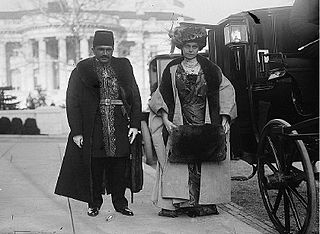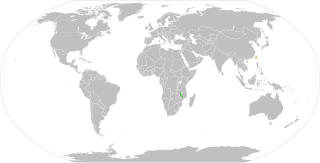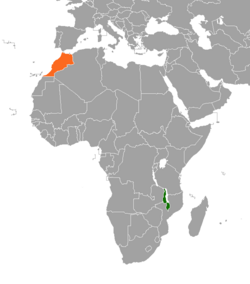
Like its Eastern Caribbean neighbours, the main priority of Dominica's foreign relations is economic development. The country maintains missions in Washington, New York, London, and Brussels and is represented jointly with other Organisation of Eastern Caribbean States (OECS) members in Canada. Dominica is also a member of the Caribbean Development Bank (CDB), and the Commonwealth of Nations. It became a member of the United Nations and the International Monetary Fund (IMF) in 1978 and of the World Bank and Organization of American States (OAS) in 1979.
The foreign relations of Ireland are substantially influenced by its membership of the European Union, although bilateral relations with the United States and United Kingdom are also important to the state. It is one of the group of smaller nations in the EU, and has traditionally followed a non-aligned foreign policy. Ireland has historically tended towards independence in foreign military policy, thus it is not a member of the North Atlantic Treaty Organisation and has a longstanding policy of military neutrality. According to the Irish Defence Forces, the neutrality policy has helped them to be successful in their contributions to United Nations peace-keeping missions since 1960 and subsequently in Cyprus, Lebanon and Bosnia and Herzegovina.

Malawi's former President Bakili Muluzi continued the pro-Western foreign policy established by his predecessor, Hastings Banda. It maintains excellent diplomatic relations with principal Western countries. Malawi's close relations with South Africa throughout the apartheid era strained its relations with other African nations. Following the collapse of apartheid in 1994, Malawi developed, and currently maintains, strong diplomatic relations with all African countries.

Foreign relations of Israel refers to diplomatic and trade relations between Israel and other countries around the world. Israel has diplomatic ties with 164 of the other 192 UN member states as of December 2020. Israel is a member of the United Nations and a number of other international organisations. Israel maintains full diplomatic relations with two of its Arab neighbours, Egypt and Jordan, after signing peace treaties in 1979 and 1994 respectively. In 2020, Israel signed agreements establishing diplomatic relations with four Arab League countries, Bahrain, the United Arab Emirates, Sudan and Morocco. As of 2021, Israel had formal diplomatic relations with 168 other countries, while twenty-eight U.N. member states have never established, or have broken off diplomatic relations with Israel.
This article is about the foreign relations of Tuvalu. From 1916 to 1975, Tuvalu was part of the Gilbert and Ellice Islands colony of the United Kingdom. A referendum was held in 1974 to determine whether the Gilbert Islands and Ellice Islands should each have their own administration. As a consequence of the referendum, the separate British colonies of Kiribati and Tuvalu were formed. Tuvalu became fully independent as a sovereign state within the Commonwealth on 1 October 1978. On 5 September 2000, Tuvalu became the 189th member of the United Nations.

A chargé d'affaires, plural chargés d'affaires, often shortened to chargé (French) and sometimes in colloquial English to charge-D, is a diplomat who serves as an embassy's chief of mission in the absence of the ambassador. The term is French for "charged with [in charge of] business", the affaires or business being the ordinary duties of an ambassador. Chargé is masculine in gender; a female is a chargée d'affaires.

The foreign relations of the Sahrawi Arab Democratic Republic (SADR) are conducted by the Polisario Front, which maintains a network of representation offices and embassies in foreign countries.

In a referendum on 21 May 2006, the people of Montenegro opted to leave the State Union of Serbia and Montenegro. This result was confirmed with a declaration of independence by the Montenegrin parliament on 3 June 2006. It simultaneously requested international recognition and outlined foreign policy goals.

The foreign relations of the Islamic Republic of Mauritania have, since 1960, been dominated by the issues of the Spanish Sahara and the recognition of its independence by its neighbours, particularly Morocco. Mauritania's foreign relations are handled by the Minister for Foreign Affairs and Cooperation, who is currently Ismail Ould Cheikh Ahmed.

Algeria–Morocco relations refers to bilateral relations between the People's Democratic Republic of Algeria and the Kingdom of Morocco. Morocco is represented in Algeria by an embassy and consulate general in Algiers, as well as two consulates in Oran and Sidi Bel Abbès; Algeria is represented in Morocco by a consulate general in Rabat, and two consulates in Casablanca and Oujda. Relations between the two North African states have been marred by several crises since their independence, particularly the 1963 Sand War, the Western Sahara War of 1975–1991, the closing of the Algeria-Morocco border in 1994 and an ongoing disagreement over the political status of Western Sahara.
The Sahrawi Arab Democratic Republic (SADR) was proclaimed by the Polisario Front on 27 February 1976, in Bir Lehlu, Western Sahara. SADR claims sovereignty over the entire territory of Western Sahara, a former Spanish colony; however, at present the SADR government controls only about 20–25% of the territory it claims. It calls the territories under its control the "Liberated Territories".

Malawi–Taiwan relations refer to foreign relations between Malawi and Taiwan. Diplomatic relations existed from 1966 to 2008. There are no current official diplomatic relations between the two countries.

Malawi and Israel established diplomatic relations in July 1964 and have continued relations since. In September 2020, Malawian President Lazarus Chakwera announced that Malawi would open a diplomatic mission in Jerusalem.

The Ministry of Foreign Affairs, African Cooperation and Moroccan Expatriates is the foreign affairs ministry of Morocco, responsible for implementing Morocco's foreign policy and ensuring relations with foreign states.

Diplomatic relations between Australia and Morocco were established in 1976. Morocco has had an embassy in Canberra since 2004 and the Australian Embassy in Rabat was established in May 2017, upgrading the existing Austrade office in Rabat. Previously the Australian Embassy in Paris was accredited to Morocco since 1978.

Slovakia–Spain relations are the bilateral relations between Slovakia and Spain. Slovakia has an embassy in Madrid and three consulate s in Barcelona, Málaga and Santa Cruz de Tenerife. Spain has an embassy in Bratislava. The relations of these two countries are defined mainly by the membership of both NATO and the European Union. On the occasion of the celebration of the XXV anniversary of the independence of the Slovak Republic from Czechoslovakia, Ambassador Vladimír Grácz and his lady offered a brilliant reception on January 11, 2019. The protocol act began with the interpretation of the anthems of Spain and Slovakia. Ambassador Grácz confirmed that “relations with Spain are impeccable, of excellent collaboration, of great harmony and mutual support in the candidacies for international institutions. Economic relations are fantastic, as are cultural relations. On a personal basis he recognizes that Spain is a wonderful country, which has been able to meet him in the company of his wife.

Libya–Spain relations are the bilateral and diplomatic relations between these two countries. Libya has an embassy in Madrid, and Spain has one in Tripoli.
















